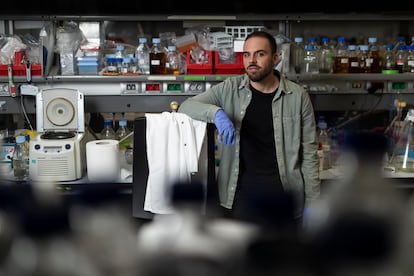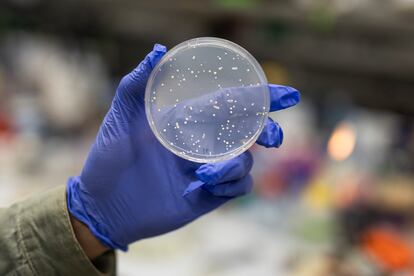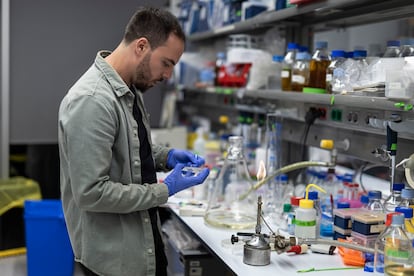The first ‘human domainome’ reveals the cause of a multitude of diseases
An ingenious large-scale experiment in Barcelona has led to the creation of a catalog detailing the effects of half a million DNA mutations

It is surprising, but until relatively recently, humanity was unaware of the shape of the basic building blocks of life. On July 22, 2021, Google’s DeepMind announced that it had successfully predicted, with unprecedented accuracy, the structure of nearly all the proteins that make up the human body. Two of its scientists, Demis Hassabis and John Jumper, were awarded the latest Nobel Prize in Chemistry for this achievement, alongside biochemist David Baker, who has made similar advances at the University of Washington.
However, much remains to be understood about the effects of mutations on these structures. A team of four researchers, including the Spanish scientist Antoni Beltran, presented on Wednesday the first catalog of half a million mutations. They have named it “Human Domainome 1,” and it marks a significant step toward truly personalized medicine, with medications tailored to each individual.
Each person has a unique DNA molecule in every one of their cells. It acts like a manual with 20,000 pages — each page representing a gene, which contains the instructions for producing different proteins. These proteins are the tiny machines that carry out the essential functions of life: insulin regulating blood sugar, keratin in hair, hemoglobin transporting oxygen in the blood, collagen in bones, and pepsin aiding digestion in the stomach.
A tiny mistake on any page of this manual can disrupt the meaning of the instructions, just like if a typo in a manual meant that a ventilator was created instead of a helicopter. These missense mutations, which alter the intended meaning of the instructions, are responsible for a third of all known human genetic diseases.
Antoni Beltran, 32, says he is fascinated by this complexity of life. The bioinformatician — who excelled in his biochemistry studies, winning Spain’s National End-of-Degree Award — works at the Center for Genomic Regulation in Barcelona. There, he is tackling one of biology’s most perplexing questions: is it possible to accurately predict all the characteristics of a protein from the sequence of instructions encoded in DNA?
“We’re going to get there faster than we thought,” he declares, his voice filled with conviction on the other end of the phone. In 2021, his boss, the British scientist Ben Lehner, 46, proposed that he begin compiling a catalog of all possible mutations in the key regions of each human protein. The task was enormous, but the two devised an ingenious strategy for conducting large-scale experiments.
First, they modified yeast cells so that their ability to divide would depend on a mouse protein. Then, they introduced human proteins with all possible mutations, and fused them one by one with the mouse protein. If the human protein is properly folded, the yeast can divide. And the faster the yeast multiplies, the more stable the human protein is.

Antoni Beltran and Ben Lehner presented the astonishing results of their work on Wednesday. They have measured the stability of 563,000 missense mutations in more than 400 types of human proteins — nearly five times the amount of research conducted worldwide to date, according to their calculations. “If we are able to understand all these mechanisms, we’ll be able to tailor the best possible treatment for each patient based on their specific mutation,” says Beltran. Their work was published in Nature, a leading journal in the global scientific community.
The team analyzed 621 missense mutations known to contribute to different diseases. Their findings reveal that 60% of these mutations reduce protein stability. As an example, the authors point to crystallins, the primary structural proteins in the eye’s lens. Three out of four mutations linked to cataract formation cause crystallins to become more unstable, leading them to clump together and blur vision.
Beltran and Lehner also highlight AEC syndrome, a disorder characterized by partial eyelid fusion, and reducing body myopathy (RBM), a rare disease marked by progressive muscle weakness. In both cases, mutations cause proteins to become unstable and form aggregates. “We have revealed, on an unprecedented scale, how mutations cause disease at the molecular level,” says Beltran. The study also involved scientists Xiang’er Jiang and Yue Shen from the Chinese giant BGI Research.
Bioinformatician Alan Rubin, one of the founders of the large international open-access platform MaveDB, which has been collecting data on the effects of mutated protein variants since 2019, commends the Barcelona researchers for sharing their valuable findings in this database even before their publication in Nature. “The authors clearly demonstrate the value of measuring protein stability, as it is a major mechanism by which genetic variants can contribute to disease,” says Rubin, who is based at the Walter and Eliza Hall Institute of Medical Research in Melbourne, Australia.

The authors acknowledge “a major limitation” in their work. They have not analyzed complete proteins, but rather their key areas, known as domains — specific regions that can fold independently and serve distinct functions. Rubin highlights that it is precisely this approach that has enabled them to conduct the experiment on such a large scale. “This study also clearly shows that there are many more disease-causing variants that do not affect protein stability and there is still a lot of work to do to improve our collective understanding,” he says.
The four researchers point to Rett syndrome as an example — a rare genetic disorder associated with autism spectrum disorder, which predominantly affects girls. It is caused by mutations in the MECP2 gene, responsible for producing a protein essential for brain development. Their new analysis reveals that while some mutations do not destabilize the protein, they do interfere with its ability to bind to DNA and regulate other genes.
Ben Lehner is one of the latest members of the Royal Society, the prestigious British scientific academy founded in 1660, which has included luminaries such as Charles Darwin, Albert Einstein, Rita Levi-Montalcini, and Santiago Ramón y Cajal. For Lehner and his colleagues, the Human Domainome project “is part of a global effort to determine the consequences of each mutation in every human protein.” In his view, measuring the biophysical properties of millions of mutated protein variants will reveal patterns and enable the development of artificial intelligence tools capable of making precise predictions from DNA sequences — much like Google DeepMind’s AlphaFold program does for normal proteins. “It’s just a matter of time,” says Beltran.
Sign up for our weekly newsletter to get more English-language news coverage from EL PAÍS USA Edition
Tu suscripción se está usando en otro dispositivo
¿Quieres añadir otro usuario a tu suscripción?
Si continúas leyendo en este dispositivo, no se podrá leer en el otro.
FlechaTu suscripción se está usando en otro dispositivo y solo puedes acceder a EL PAÍS desde un dispositivo a la vez.
Si quieres compartir tu cuenta, cambia tu suscripción a la modalidad Premium, así podrás añadir otro usuario. Cada uno accederá con su propia cuenta de email, lo que os permitirá personalizar vuestra experiencia en EL PAÍS.
¿Tienes una suscripción de empresa? Accede aquí para contratar más cuentas.
En el caso de no saber quién está usando tu cuenta, te recomendamos cambiar tu contraseña aquí.
Si decides continuar compartiendo tu cuenta, este mensaje se mostrará en tu dispositivo y en el de la otra persona que está usando tu cuenta de forma indefinida, afectando a tu experiencia de lectura. Puedes consultar aquí los términos y condiciones de la suscripción digital.









































